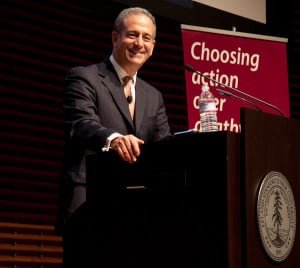“We are playing with fire by thinking that this is all over,” warned former Senator Russ Feingold in a speech Wednesday afternoon titled, “While America Sleeps: A Wake-Up Call for the Post-9/11 Era.”
Feingold delivered the speech to an audience of more than 200 people at CEMEX

Auditorium in the Knight Management Center.
Larry Diamond, director of the Center for Democracy, Development, and the Rule of Law (CDDRL), introduced Feingold as “someone who is deeply troubled by incivility in American politics” and “has experience that reflects his distinctive blend of concerns in world issues.”
Feingold, a Wisconsin senator for 18 years, is currently at Stanford as a distinguished visitor at the Haas Center for Public Service during winter quarter. Throughout the quarter he will lead a weekly seminar, mentor students, participate in faculty discussions and give two public lectures.
Throughout his speech, Feingold repeatedly criticized the lack of attention paid to foreign policy in the United States.
“We are obsessed with the current election over who is up and down,” he said. “Precious little is being said about our position in the rest of the world.”
According to Feingold, “big money” and corruption dominate the U.S. government, which is characterized by divisiveness and stubbornness on both domestic and international issues.
“If we cannot work on both domestic and international policy, we won’t be safe,” he warned. “We will continue to stumble as other nations use their resources to strategically assert themselves in the world.”
Feingold advocated a surgical approach to handling international issues, citing a strategy of intervening in Libya as “an example that you do not need boots on the ground or complete intervention to complete a goal.”
“We have a single-by-single-country approach of tackling issues,” he said. “The discussion was never focused on the broad landscape.”
Feingold emphasized Africa’s importance in the fight against terrorism, bringing attention to extremist groups in Africa such as al-Qaeda in the Islamic Maghreb (AQIM). Feingold cited Somalia as a state tainted with piracy and also discussed the emergence of an al-Qaeda chapter and strong connections to Yemen, an example of a failure in U.S foreign policy.
According to Feingold, there has been a trivialization and neglect of foreign policy, particularly by the right in U.S. politics. He pointed to how the idea of American exceptionalism is often linked to American foreign policy, something he deemed “foolish.”
“I believe that the U.S. can remain the leading nation in the world,” he said. “But we cannot keep briefly waking up from our slumber to yell out, ‘We are number one!’ and then go back to sleep.”
Feingold encouraged Americans to be more involved as global citizens, particularly by learning languages.
After the talk, audience members posed questions on an array of topics ranging from the U.S. role in Egypt to intervention in Syria to the possibility of an Iranian attack.
In response to a question on why the United States is disliked in some regions of the world, Feingold responded saying, “I think it has to do with the U.S. support of nations with tyrannical regimes. It breeds a situation where people can be sucked into protest or worse, violence.”
“Mr. Feingold’s sincerity was obvious and he gave a number of cogent reasons for greater engagement beyond our borders,” said Aaron Sekhri ‘15, who attended the lecture. “His emphasis on the need to become world citizens and challenge ourselves in spheres alien to us was inspiring.”